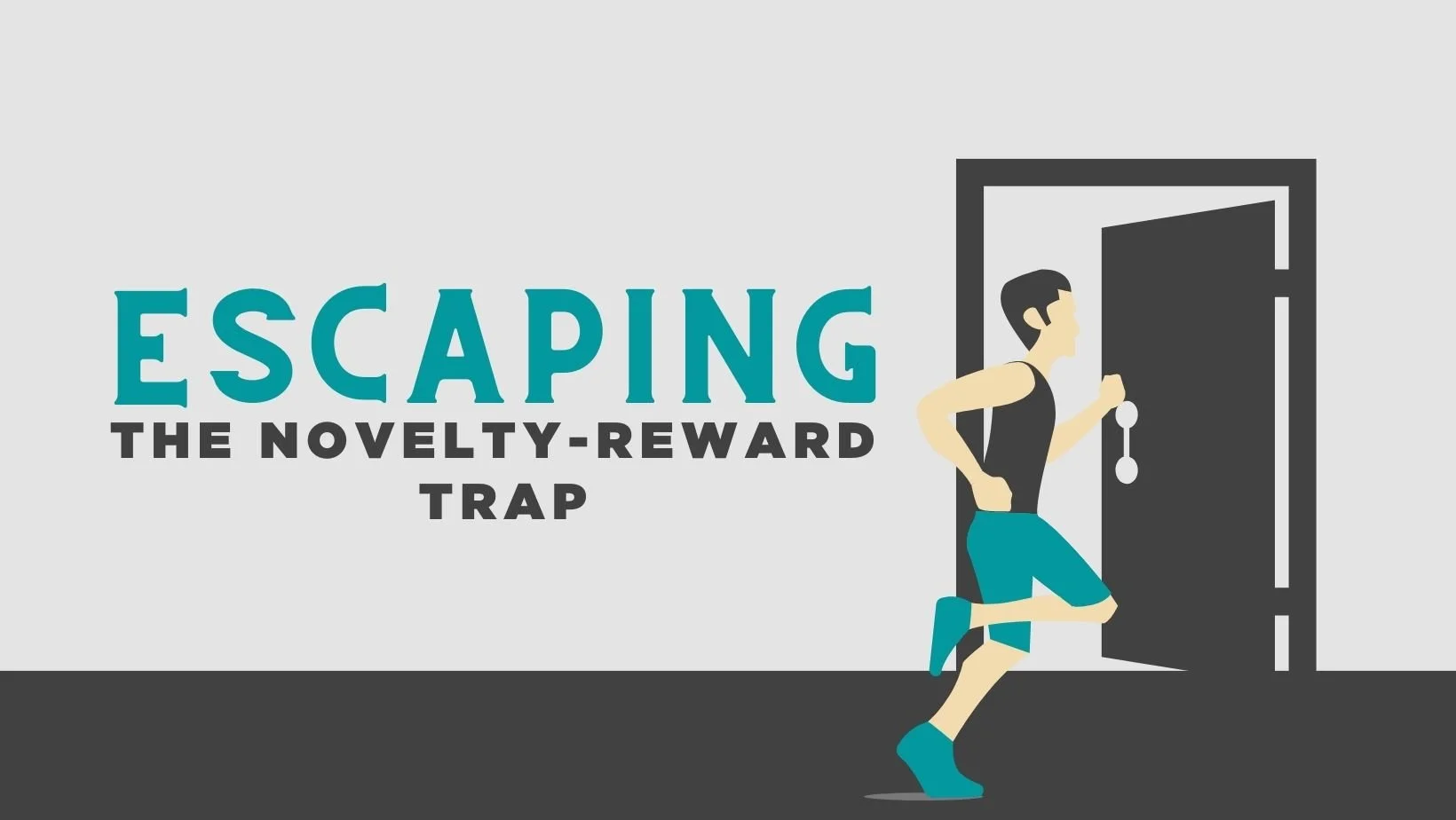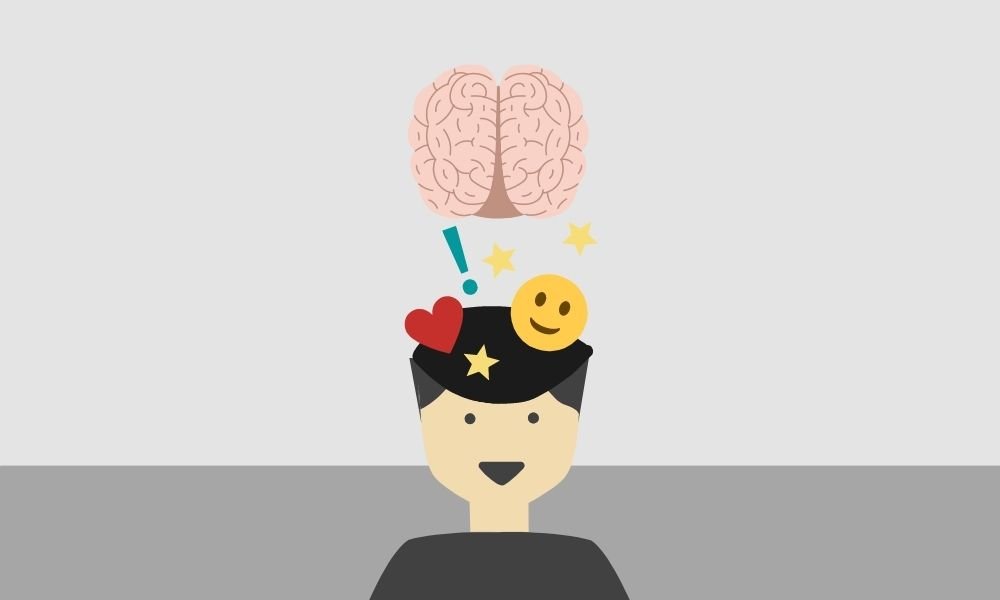Escaping the Novelty-Reward Trap
Imagine you’re on a hike in the hills. You’ve been walking along a narrow valley in the shadows and are getting tired. But you can see that with just a little more effort you’ll be able to hike up to a ridge in the distance.
Looking at that promising ridge, most people will feel an instinctual drive to keep moving. Push on. Go check it out. Find out what the view is from up there. Just as spiders feel a need to make webs, and birds to migrate south in winter, humans have an evolutionary pull to be curious and explore.
There have certainly been times when curiosity led our ancestors to disaster, but the fact that we’re here today shows that more often than not, curiosity led us to opportunity. And when a biological trait creates opportunity, evolution will find ways to reward the brains that have that trait.
As you crest the final few steps of that ridge you can feel for yourself the way this reward system works. You experience a wave of pleasure, accomplishment, and satisfaction as you take in the view. Your endocrine system is dosing you with serotonin, dopamine, and a dozen other feel good hormones on top of that ridge. This is your brain’s way of saying “Good job human. You did a thing that boosts our chance of survival. Do more stuff like that and I’ll squirt some more of this feel-good juice into your system.”
If you were to go back and do this hike every week, you’d notice that the good vibes you got from cresting that ridge would start to have diminishing returns. The brain doesn’t want you to keep climbing the same hill and seeing the same view. It doesn’t give you those reward hormones for repeating a trick over and over again.
Subconsciously, you’d find yourself deriving less satisfaction from “the same old hike” and before long, you’d be looking for other hikes in the vicinity. You crave new ridges, new mountaintops, new exploration, because this is what the brain demands to get those feel-good hormones flowing. Over time, driven by this subtle instinct, you’d find that you’d been on every major hike in your area.
Your brain has hoodwinked you into becoming an expert on the hills and valleys you live in, knowledge which subtly improves you and your relatives chances of survival.
Evolution puts pressure on you to adapt and survive, and one of the levers to apply that pressure is the reward system that comes with curiosity and novelty. Once you’re made aware of this setup, so many opaque parts of life suddenly become clear.
This is why you eventually get tired of having your favorite food too often. Your brain is prodding you to diversify your diet and holds back the rewards until you do.
This is why your job can become a tedious grind. If you’re not facing new challenges but just repeating the same steps the brain stops rewarding you for getting things done.
This is why your relationships change tone and tenor over time. The things that initially excited you about a person will come to wear on you if the behavior never changes. And of course your behaviors wear out their welcome with others as well!
Finally, this is why you might find yourself losing interest in fitness and sports activities that used to delight you. Every decade we see dozens of fitness fads come and go as people work their way through the novelty-reward cycle. Someone’s first Zumba class is fun and exhilarating. Their 20th might feel more like a grind. So they gradually stop doing Zumba and take up yoga. The cycle repeats, and after a while they feel like yoga just isn’t doing it for them anymore. So they join a CrossFit gym, and a year later buy a Peloton bike, and so on.
Just as the brain uses reward hormones to prod you to explore your environment and eat a varied diet, it prods you to find variety in your exercise by making your old routines less rewarding with time. Make sense?
There are a few big takeaways that come out of understanding the novelty-reward cycle.
When you get bored of a fitness routine, it’s not because you’re lazy or undisciplined.
It’s perfectly natural to lose interest in experiences which are repeated too often. In fact, it’s a sign that you’re a stable, healthy human being with a well-functioning brain. Don’t pile on a bunch of guilt or shame when you feel the call to move on to something different. Sometimes you need a change of pace, and that’s normal.
However, be careful that you don’t rob yourself of deeper experiences by bailing too early.
Understanding how your biology rewards novelty can be dangerous knowledge. When a whiff of tedium strikes, it’s easy to tell yourself, “Oh well, my brain is telling me it’s time to move on, guess I’ll pack my bags.” But many parts of life, including fitness, aren’t pure lines of upward progress. There are always plateaus between breakthroughs.
When you’re on a plateau, it can feel a lot like an experience that has run its course. But if you persevere through the plateau, you’ll break into a whole new level of progress that comes with new brain-chemical rewards. The hard part of life is knowing the difference between a plateau and a dead-end. Plateaus feel frustrating because you haven’t mastered the task at hand and feel stuck, while dead-ends feel boring because you have mastered the task at hand and are stuck.
When someone is always switching away from challenges at the first sign of a plateau, they miss out on the tremendously rewarding brain activity that comes from mastery and deeper understanding of a skill. Don’t confuse plateaus with the end of your time with an experience. Often it’s just the beginning of the really good stuff.
A way to escape the novelty cycle altogether.
It’s perfectly fine to try novel fitness methods when you’re not feeling rewarded for your efforts. In fact, there’s an entire fad-industrial complex built on this tendency we have.
However, like most things in life, fitness boils down to a small number of things you need to do right -— eat good food in the right portion, burn through energy with moderate cardiovascular exercise, and stimulate your musculature with resistance training. If you’re constantly trying to find new, exciting ways to do these basic things, you’re going to be putting a lot of time, effort and money into bells and whistles that dress up these core practices in novel ways, but don’t offer any real advantages in results.
Fortunately, there’s another way. Bypass brain chemistry.
Think about the mundane chores of your day. When you wash the dishes, are you constantly looking for a fancy new way to scrub a plate? Do you spend hours online looking for the best sponge and the most ergonomic sink? Probably not. You just pick up the sponge, wash the plate, set it out to dry and move on with your day. It’s just washing dishes. It’s not something you’re looking for big hormonal rewards from.
We have a dozen of these humdrum tasks in a day. Shower. Wash hair. Shave. Brush teeth. Make the bed. Get dressed. Commute to work (or get set up in the home office). Check the mail. Prepare meals. Walk the dog. Wash the dishes. Because these things are routine, you don’t look for or expect a huge flush of accomplishment when you do them.
If you want to establish a stable fitness routine that doesn’t have you bouncing from one fad to the next, just add “do some exercise” to that list of daily, can’t-miss chores.
This is a lot easier to say than to do. When you were a child, your parents had to remind you to brush your teeth. In the same way, at first you’ll need to make exercise a daily chore that you do whether you’re in the mood or not. Do your best to actively avoid building up exercise as something special. This is not climbing a mountain, or mastering a new skill. This is washing the dishes. It’s not supposed to fill you with joy (although it sometimes will). It’s just supposed to get the job done. In this case, the job is keeping your body functioning well year in and year out, which is a pretty important item on the “to-do” list.
Whenever you meet someone who’s successfully integrated consistent exercise in their life, they’ll always have this “daily chore” approach. They’re not moving from one method to another every few months. They’ve found their system, and it works for them. This isn’t to say they’re in a rut. Consistent exercisers are often the most adventurous people you meet. They know their bodies will be up to the challenge, and out there looking for ways to get those brain chemistry rewards like everyone else. But these adventures are built upon a foundation of ordinary, boring, “nothing-special” fitness chores. No novelty needed.
Remember this the next time you find yourself casting about for a new and exciting way to get in shape. Daily exercise doesn’t need to get you a rush of happy hormones. It just needs to get done!






